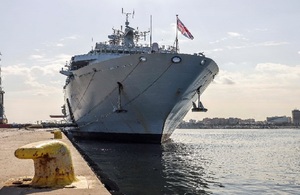PM Liz Truss: Time to find common cause with our European friends
Security, energy and migration are three of the most urgent priorities for the British people, so they are top of my agenda too. That’s why I am travelling to Prague for today’s European leaders’ meeting.
These vital issues affect the whole of our continent, so it is right that we find common cause with our European friends and allies. It’s also why we want to see a strong voice for non-EU countries like Ukraine, Norway and Switzerland.
Today’s meeting is not an EU construct or an EU alternative. I am very clear about that. It brings together governments from across Europe, around a third of whom are outside the EU. A post-Brexit Britain, as an independent country outside the EU, should be involved in discussions that affect the entire continent and all of us here at home. We are taking part as an independent sovereign nation, and we will act as one.
Brexit was never about the UK stepping away from our proud and historic role as a leading nation in the region and beyond. We always believed we would find new ways of working that reflected our shared values and interests.
Our actions in Ukraine have shown this to be true. No European country has done more than the UK to arm the Ukrainians in their fight for freedom and to lead the imposition of economic sanctions on Russia. Yet our actions are all the stronger because of the way that we collaborated with our European friends.
We have worked with the EU through the G7 and helped Sweden and Finland with their accession to Nato, which remains the bedrock of our collective defence. We have co-operated militarily with European allies through the Joint Expeditionary Force. We are training Ukrainian soldiers together. And we are strengthening partnerships with other European friends, including Norway on energy security and Switzerland on science and research.
So I welcome the opportunity to work with leaders from across the continent in this new forum. But this must not cut across the G7 and Nato, and it must not be a talking shop. I want to see concrete action and delivery on three key priorities.
First, we must ensure that Putin is defeated. His attempts at mobilisation and annexation are a show of weakness. Ukraine’s counter offensive is succeeding, and Russia’s will is fracturing. This is the moment to redouble our resolve. The UK is sending £2.3 billion of military support to Ukraine this year — and we will match or exceed that next year.
I will urge my European friends to continue to work with us in providing more weapons, imposing more sanctions, and backing Ukraine in pushing Russian forces out.
Second, we must end our addiction to Russian hydrocarbons. Yesterday at the Conservative Party conference, I set out our plan for growth and the vital importance of becoming less reliant on authoritarians for our energy. It is right that we talk with our European allies about how we do that collectively. Putin is hoping he can divide us in a scramble for energy supplies. We must show him that he is wrong.
The UK sends and receives both gas and electricity through the undersea cables and pipelines that link us with neighbours like France, Belgium and the Netherlands. Today we must all commit to keeping those connections open this winter so we keep the lights on across the continent.
The UK will also play a leading role in protecting critical energy infrastructure. This week the Royal Navy deployed HMS Enterprise and HMS Somerset to work with Norway and our allies in the North and Norwegian Seas.
Together, we will deter any threat to underwater pipelines.
We must also act now to make sure we are never in this position again. We must usher in a new era of European energy independence, dramatically accelerating our own energy production. Today I will be discussing deeper bilateral nuclear co-operation with President Macron, including progress on Sizewell C. We are ready to work with our European friends to develop next-generation interconnectors in the North Sea. And I hope to make progress towards new partnerships on offshore wind, all of which will help to make the UK a net energy exporter by 2040.
Third, we must use the opportunity of this forum to focus on migration. We are proud of the way that we have opened our homes to 130,000 Ukrainian refugees. But we need a stronger response to the crime gangs that exploit desperate people. Today we will be deepening our joint working with France, the Netherlands and other countries along the migration route to step up our collective response to this trans-national tragedy.
I believe that with authoritarian states undermining stability and security around the world, democratic nations need to be bolder and more innovative in how they collaborate to ensure that our shared values prevail.
It is in this spirit that I will join my fellow European leaders today and ensure that this new forum delivers for the British people.

